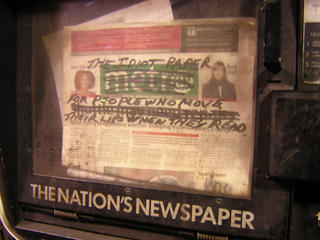As many have noted, the Bush administration’s fetish for smaller government made it lethally slow and ineffective in responding to Hurricane Katrina. Economist and New York Times columnist
Paul Krugman suggested yesterday that the weakening of Federal Emergency Management Agency infrastructure that caused this is also going on in (at the least) the Food and Drug Administration, Corporation for Public Broadcasting, Treasury Department and even the agency’s parent, the Department of Homeland Security, and this means weaker infrastructure for the entire nation.
Seeing this, it’s hard not to fixate on Bush adviser Grover Norquist’s infamous comment that he doesn’t “want to abolish government. I simply want to reduce it to the size where I can drag it into the bathroom and drown it in the bathtub.” And now we get a glimpse of what the United States looks like with Bush implementing Norquist’s vision: like New Orleans and parts of Mississippi after Katrina, like everywhere before the New Deal and Great Society.
It’s working, too. Donations to help victims of Katrina have been huge, far bigger and faster than after the terrorist attacks of Sept. 11, 2001, and today Stacy Palmer, editor of the Chronicle of Philanthropy,
told the Times why: “I really think the biggest reason has got to be people seeing government agencies not doing the right thing, and that drove them to support a private response.” Eventually, taxpayers will wonder why they’re giving so much money to the federal government when private-sector groups are doing all the work. (It’s sort of like being taxed twice.)
But there’s an undertone that’s even more ominous than Norquist’s “bathtub” comment, and an image of America that’s even uglier.
Consider that FEMA’s list of volunteer agencies accepting Katrina donations comprised 25 groups, perhaps three of which are secular, such as the American Red Cross, rather than religious, such as
televangelist Pat Robertson’s controversial Operation Blessing. Among those left off the list was
Operation USA, which has been helping nations recover from disasters for more than a quarter of a century — and is, in fact, accepting donations and helping victims of Katrina.
This isn’t so strange from an administration pushing “faith-based initiatives” since before it seized the White House. (It is strange from a group of politicians that claim to be interested in the intent of the nation’s founders, though. All the way back in 1811, President Madison vetoed a bill that would have given federal money to a church helping the poor, saying the funding “exceeds the rightful authority to which governments are limited by the essential distinction between civil and religious functions.”) The message from this administration is that it values the help of religious groups and wants people to rely on them more than they do secular groups. And surely some of the emotionally, physically or financially injured people getting help from religious groups in especially trying times will become more religious; it’s the principle on which missionary work rests.
The image of America that arises, then, is of a nation whose government is too poor to provide for people and whose religious groups make up for the lack. At its most extreme, the image is that of Afghanistan and Pakistan, where people have little choice but to send their kids to madrassas, where room and board is free and the education is strict and religious, where children become fit for little but more religion and jihad, except that in the United States the education would be Christian rather than Islamic.
Christian conservatives have long been fans of vouchers so kids can escape failing public schools, the prime alternative being, not so coincidentally, religious schools. The faith-based initiatives effort is the same, but for social-service and safety-net needs rather than for education.
They are a patient bunch, these religious conservatives, but every time they elect one of their own to high office their need for patience diminishes. Now they’ve got Bush, who said
God wanted him to run for president, who declared a
Jesus Day in Texas and who feels that
“Events aren’t moved by blind change and chance [but] by the hand of a just and faithful God.”Despite this, and despite FEMA’s transparent attempts to steer money toward religious groups, there are signs the conservatives must still wait for their fully Christian nation. As of Sept. 11, about 75 percent of money donated for Katrina aid went to the secular American Red Cross — $584 million out of $738 million.

 I know this is shameless, but I’m actually reposting.
I know this is shameless, but I’m actually reposting.



